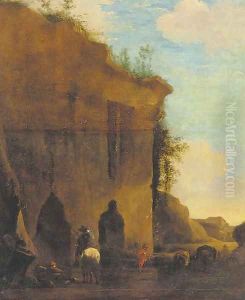Nicolaes Bercham Paintings
Nicolaes Berchem (or Bercham) was a Dutch Golden Age painter who was born on October 1, 1620, in Haarlem, Netherlands. He was the son of the still life painter Pieter Claesz, and his mother was Grietje Dirckx. Berchem showed an early inclination towards art, likely influenced by his father's profession. He initially studied under his father and later apprenticed with various artists, including Jan van Goyen, Claes Moeyaert, Pieter de Grebber, and Jan Wils. Berchem then went on to become a highly respected figure in the Dutch art scene.
Berchem is best known for his pastoral landscapes, which often featured Italianate elements, despite there being no concrete evidence that he ever visited Italy. His work typically includes scenes with lush, rolling countryside dotted with classical ruins and figures, such as shepherds and milkmaids, engaging in daily activities. His paintings are characterized by a warm, golden light and a soft, atmospheric quality, which can be attributed to the influence of the Italian masters and his contemporaries in the Dutch Italianate movement, like Jan Both and Cornelis van Poelenburgh.
Throughout his career, Berchem experimented with various subjects, including genre scenes, animal studies, and Biblical and mythological narratives, but his Italianate landscapes remained his most popular works. His paintings were sought after by collectors and fellow artists alike, and they had a considerable impact on the development of landscape painting in Europe. Berchem also occasionally painted the staffage for other artists' landscapes, including works by Jacob van Ruisdael and Paulus Potter.
Berchem was a prolific artist, and his oeuvre includes over 800 paintings, many of which were copied and imitated by others, attesting to his popularity. His influence extended beyond his lifetime, with his works having an impact on 18th-century French Rococo landscape painters and even influencing the development of 19th-century American landscape painting.
He was a member of the Haarlem Guild of Saint Luke and served as its head in various years. Despite his success, details about Berchem's personal life are relatively scarce. He married Cornelia de Nieuburgh in 1642, and the couple had several children. Berchem died on February 18, 1683, in Amsterdam, Netherlands. Today, his works are held in many prestigious institutions around the world, including the Louvre in Paris, the Hermitage Museum in Saint Petersburg, and the Rijksmuseum in Amsterdam.
